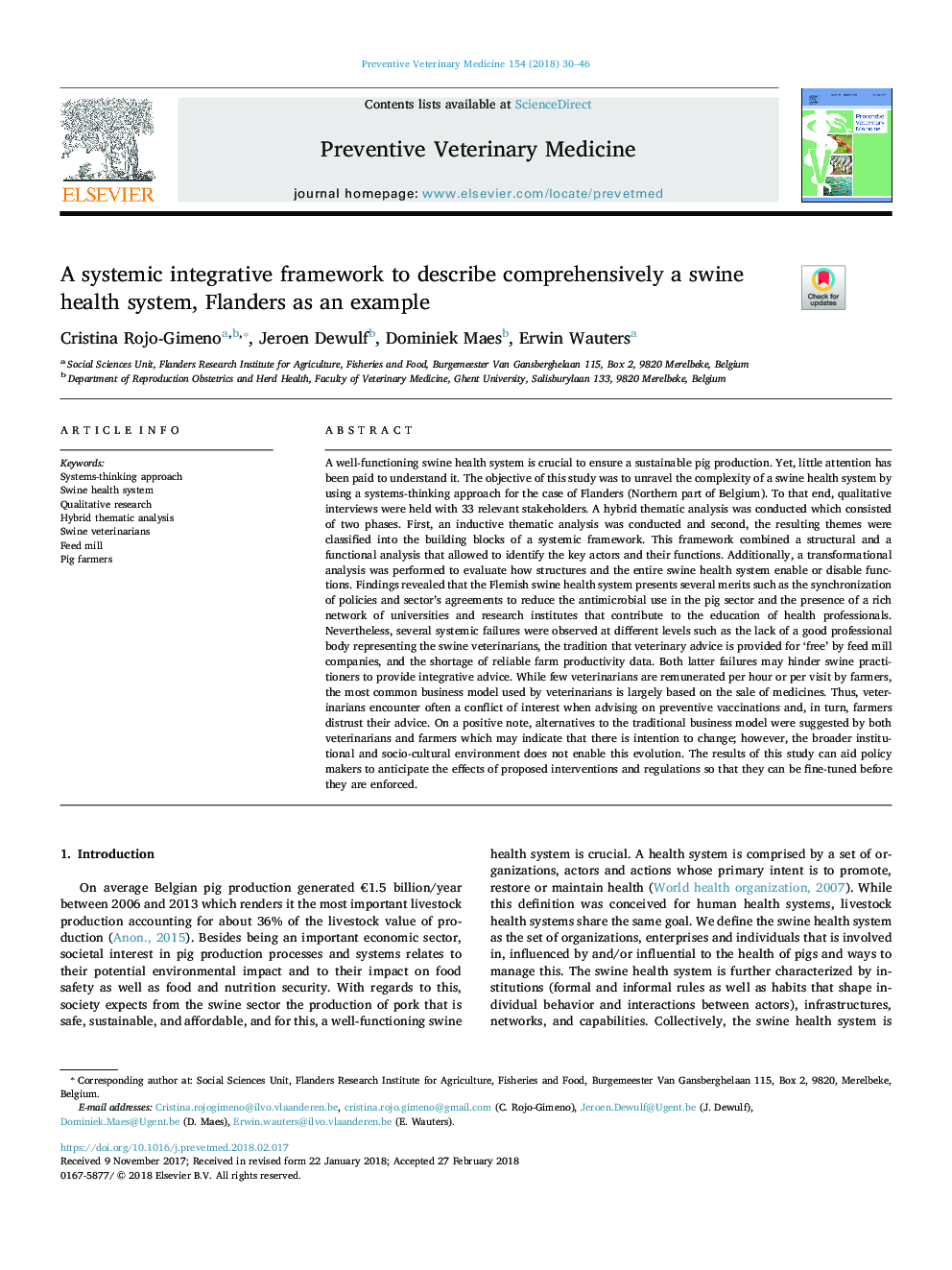| کد مقاله | کد نشریه | سال انتشار | مقاله انگلیسی | نسخه تمام متن |
|---|---|---|---|---|
| 8503429 | 1554136 | 2018 | 17 صفحه PDF | دانلود رایگان |
عنوان انگلیسی مقاله ISI
A systemic integrative framework to describe comprehensively a swine health system, Flanders as an example
ترجمه فارسی عنوان
یک چارچوب یکپارچه سیستماتیک برای توصیف جامع سیستم بهداشتی خوک، فلاندر به عنوان مثال
دانلود مقاله + سفارش ترجمه
دانلود مقاله ISI انگلیسی
رایگان برای ایرانیان
کلمات کلیدی
رویکرد سیستمهای تفکر، سیستم بهداشتی سووی، تحقیق کیفی، تجزیه و تحلیل موضوعی هیبرید، دامپزشکان سوسیس، آسیاب خوراکی، کشاورزان خوک،
ترجمه چکیده
یک سیستم بهداشتی خوب خوک برای تضمین تولید خوک های پایدار حیاتی است. با این حال، توجه کمی به آن درک شده است. هدف از این مطالعه بررسی پیچیدگی یک سیستم بهداشتی خوک با استفاده از رویکرد تفکر سیستم در مورد فلاندرز (قسمت شمالی بلژیک) است. برای این منظور مصاحبه های کیفی با 33 سهامدار مربوطه برگزار شد. تجزیه و تحلیل موضوعی هیبریدی انجام شد که شامل دو مرحله بود. ابتدا یک تجزیه و تحلیل تئوری الگویی انجام شد و دوم، مضامین حاصل به بلوک های ساختاری یک چارچوب سیستمیک طبقه بندی شدند. این چارچوب یک تجزیه و تحلیل ساختاری و عملکردی را به وجود آورد که به شناسایی بازیگران کلیدی و عملکرد آنها کمک کرد. علاوه بر این، یک تجزیه و تحلیل تحول به منظور ارزیابی نحوه عملکرد ساختارها و کل سیستم بهداشت خوک انجام شد. یافته ها نشان داد که سیستم بهداشت سیب فلاندی دارای مزایای متعددی از جمله هماهنگ سازی سیاست ها و توافقنامه های بخش برای کاهش استفاده از ضد میکروبی در بخش خوک و وجود یک شبکه غنی از دانشگاه ها و موسسات تحقیقاتی است که به آموزش متخصصان بهداشت کمک می کند. با این وجود، چندین شکست سیستماتیک در سطوح مختلف نظیر فقدان یک بدن حرفه ای مناسب که نمایندگان دامپزشکان خوک را می بینند، سنت است که توصیه های دامپزشکی برای شرکت های خوراک دام «رایگان» و کمبود داده های قابل اطمینان مزرعه مزرعه ارائه می شود. هر دو شکست ناپذیر ممکن است مانع از تمرینکنندگان گوشتخواران شوند تا توصیههای متداول را ارائه دهند. در حالی که تعداد کمی از دامپزشکان در هر ساعت یا هر بازدید از کشاورزان مستمری دریافت می کنند، شایعترین مدل تجاری که توسط دامپزشکان استفاده می شود عمدتا بر فروش داروها است. بنابراین، دامپزشکان اغلب در هنگام مشاوره در مورد واکسیناسیون پیشگیرانه اغلب مناقشه منافع را به خود جلب می کنند و به همین ترتیب کشاورزان از مشاوره خود بی اعتنایی می کنند. به طور مثبت، جایگزین های مدل تجاری سنتی توسط دامپزشکان و کشاورزان پیشنهاد شده است که ممکن است نشان دهند که قصد تغییر وجود دارد؛ با این حال، محیط گسترده تر نهادی و اجتماعی و فرهنگی این تحول را به وجود نمی آورد. نتایج این مطالعه می تواند به سیاست گذاران کمک کند تا تاثیرات مداخلات پیشنهادی و مقررات پیش بینی شده را پیش بینی کنند تا بتوان آنها را پیش از اجرای آنها تنظیم کرد.
موضوعات مرتبط
علوم زیستی و بیوفناوری
علوم کشاورزی و بیولوژیک
علوم دامی و جانورشناسی
چکیده انگلیسی
A well-functioning swine health system is crucial to ensure a sustainable pig production. Yet, little attention has been paid to understand it. The objective of this study was to unravel the complexity of a swine health system by using a systems-thinking approach for the case of Flanders (Northern part of Belgium). To that end, qualitative interviews were held with 33 relevant stakeholders. A hybrid thematic analysis was conducted which consisted of two phases. First, an inductive thematic analysis was conducted and second, the resulting themes were classified into the building blocks of a systemic framework. This framework combined a structural and a functional analysis that allowed to identify the key actors and their functions. Additionally, a transformational analysis was performed to evaluate how structures and the entire swine health system enable or disable functions. Findings revealed that the Flemish swine health system presents several merits such as the synchronization of policies and sector's agreements to reduce the antimicrobial use in the pig sector and the presence of a rich network of universities and research institutes that contribute to the education of health professionals. Nevertheless, several systemic failures were observed at different levels such as the lack of a good professional body representing the swine veterinarians, the tradition that veterinary advice is provided for 'free' by feed mill companies, and the shortage of reliable farm productivity data. Both latter failures may hinder swine practitioners to provide integrative advice. While few veterinarians are remunerated per hour or per visit by farmers, the most common business model used by veterinarians is largely based on the sale of medicines. Thus, veterinarians encounter often a conflict of interest when advising on preventive vaccinations and, in turn, farmers distrust their advice. On a positive note, alternatives to the traditional business model were suggested by both veterinarians and farmers which may indicate that there is intention to change; however, the broader institutional and socio-cultural environment does not enable this evolution. The results of this study can aid policy makers to anticipate the effects of proposed interventions and regulations so that they can be fine-tuned before they are enforced.
ناشر
Database: Elsevier - ScienceDirect (ساینس دایرکت)
Journal: Preventive Veterinary Medicine - Volume 154, 1 June 2018, Pages 30-46
Journal: Preventive Veterinary Medicine - Volume 154, 1 June 2018, Pages 30-46
نویسندگان
Cristina Rojo-Gimeno, Jeroen Dewulf, Dominiek Maes, Erwin Wauters,
